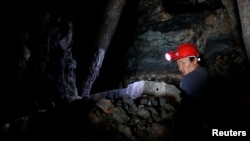Working 50 meters (164 feet) under ground with minimal air supply, Uuganbaatar is one of thousands of Mongolians trying to make a living digging for coal.
Although the mining season does not begin until autumn, when the ground freezes and work is safer, the 31-year-old and his colleagues are seeking to gain a head start by digging a shaft in Nalaikh, one of the nine districts of Mongolia's capital Ulaanbaatar, in late June.
But their mine could soon be shut by the government, which has launched an unprecedented crackdown on sites that don't meet safety standards.
That would mean even fewer opportunities for Mongolia's individual prospectors, who have already been hit hard by the privatization of mines previously open to all.
Miners such as Uuganbaatar dig for coal under loose arrangements with local unions and private companies.
"Things seem really tough for private miners now," said Uuganbaatar, who, like many Mongolians, goes by one name. "All the licenses have been bought up by influential big shots. Whenever you start to dig somewhere, someone shows up and chases us away. It's impossible to find a place or mine to dig in."
A weak economy and particularly harsh winters drove herdsman from across Mongolia to Nalaikh's private mines in the late 1990s and early 2000s.
The district, with a population of nearly 30,000, was home to Mongolia's first state mining company, which collapsed in the 1990s in the midst of a post-communist economic crisis. The firm's dilapidated buildings dot the landscape.
With the economy slowing again after a commodities boom earlier in the decade, authorities fear more people could be tempted down the mines.
"More mines will probably be shut down," said Byambadorj, a woman who ran two private mine shafts with her husband for 13 years until the government closed them in June.
"In Nalaikh, life revolves around mining, and mining is the main means to support our lives," she says, insisting that her mines were operating according to the safety standards.
The government had tried to get companies to improve safety by issuing licenses. An official said nine companies had been granted licenses, but not all had met the standards.
"People were working in shafts with no air supply," said S. Battulga, an official whose department is responsible for reviewing mining licenses across the country.
"Therefore, it was requested that the private mining licenses in Nalaikh be cancelled" on health and safety grounds, he added.
Nalaikh authorities would like people to switch from mining to work in brick factories, but no one seems keen to switch despite the danger.
In the past 25 years, the government has recorded 234 fatalities in Nalaikh's coal mines, although residents say the real number is hundreds higher.






